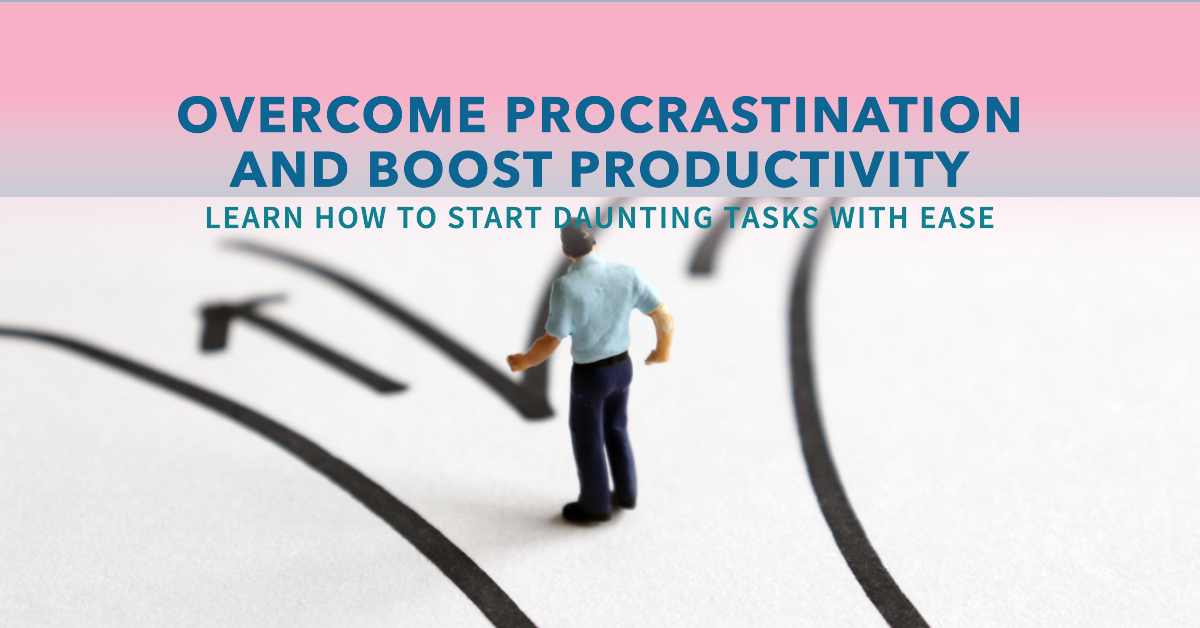Boost Your Productivity: How to Begin Daunting Tasks with Procrastination
Procrastination is often seen as the enemy of productivity, but what if we told you it could actually help you get started on daunting tasks? In this detailed blog post, we'll explore the concept of "productive procrastination" and provide you with practical tips and strategies to make procrastination work in your favor. Learn how to use procrastination as a tool to boost your productivity and tackle those intimidating projects with confidence.

Procrastination. The word itself can send shivers down the spines of even the most dedicated and disciplined individuals. It's often associated with laziness, inefficiency, and missed deadlines. However, what if we told you that procrastination could actually be harnessed to boost your productivity and help you begin daunting tasks? Intrigued? Let's explore the idea of 'productive procrastination' together.
What is Productive Procrastination?
Productive procrastination is a strategic approach to task management that involves delaying a primary task by working on other, less important tasks or activities. The key difference between traditional procrastination and productive procrastination is intentionality. In productive procrastination, you deliberately choose to postpone a task that you might find overwhelming, but you use that delay to accomplish other valuable tasks or prepare mentally for the challenging task ahead.
Here's how productive procrastination works: Instead of diving headfirst into a daunting task and risking burnout or anxiety, you take a step back. During this delay, you focus on tasks that are still important but less mentally taxing. This approach helps you gather your thoughts, build momentum, and ultimately makes starting the daunting task seem less intimidating.
The Science Behind Procrastination
Before we delve into the practical tips for using productive procrastination, it's essential to understand the psychology behind procrastination. Procrastination often stems from a fear of failure, a lack of motivation, or feeling overwhelmed by the complexity of a task. When faced with such emotions, our brain's natural response is to seek immediate gratification by avoiding the task.
However, our brains are wired to seek efficiency and reward. When we engage in productive procrastination, we provide our brains with an alternative source of gratification. By completing smaller, manageable tasks during the delay, we experience a sense of accomplishment. This can set off the release of dopamine, a brain chemical linked to feelings of pleasure and motivation.As a result, we become more inclined to tackle the primary task.
Practical Strategies for Productive Procrastination
-
Create a To-Do List: Start by creating a detailed to-do list that includes both the daunting task and smaller, more manageable tasks. Break down the complex task into smaller, actionable steps. This not only makes the larger task less overwhelming but also provides you with a clear plan for productive procrastination.
-
Set Time Limits: Allocate specific time slots for both the smaller tasks and the daunting one. For example, you might work on the smaller tasks for an hour and then dedicate the next hour to the intimidating task. Setting time limits helps you maintain focus and prevents you from endlessly delaying the primary task.
-
Use the Two-Minute Rule: If you encounter minor tasks that can be completed in less than two minutes, tackle them immediately. It's a quick win that boosts your sense of accomplishment and clears the way for more significant tasks.
-
Mindfulness and Visualization: During your procrastination period, practice mindfulness and visualization techniques. Take a few moments to visualize yourself successfully working on and completing the daunting task. This mental preparation can significantly reduce anxiety and boost your confidence.
-
Reward Yourself: Incorporate rewards into your productive procrastination strategy. Promise yourself a small treat or break once you've completed a set of smaller tasks or made progress on the primary task. Rewards serve as a way to cheer you on and help you stay motivated.
-
Stay Accountable: Share your goals and progress with a friend, colleague, or accountability partner. Knowing that someone is monitoring your progress can provide an extra layer of motivation and keep you on track.
Real-Life Applications
Let's apply the concept of productive procrastination to a common daunting task: writing a research paper. Many students and professionals find this task intimidating due to its length and complexity. Here's how productive procrastination can help:
-
Create an Outline (Productive Procrastination): Instead of immediately diving into research and writing, spend some time creating a detailed outline for your paper. This serves as productive procrastination because it's a crucial preparatory step that doesn't require diving into the full writing process.
-
Gather Research (Productive Procrastination): Use your initial procrastination period to gather the necessary research materials. This could include reading relevant articles, collecting data, or conducting interviews.
-
Write a Literature Review (Productive Procrastination): Begin by writing the literature review section of your paper. This is a task that provides valuable context for your research but isn't the full paper. By completing it first, you've started the writing process without the pressure of the entire paper.
-
Dive into Writing (Primary Task): Now that you've used productive procrastination to prepare, you're better equipped to tackle the primary task—the actual writing of the research paper. You've already made progress, built momentum, and reduced the daunting feeling of starting from scratch.
Conclusion
Procrastination doesn't have to work against your productivity. When approached strategically, as in the case of productive procrastination, it can actually become a valuable tool for overcoming daunting tasks. By breaking down complex projects, maintaining focus, and using the power of reward and preparation, you can harness procrastination to your advantage.
Remember, productive procrastination is not an excuse for endless delay. It's a structured approach to delay that fuels your motivation, builds momentum, and ultimately helps you accomplish your most challenging tasks. So, the next time you're faced with a daunting task, consider using procrastination to your advantage and watch your productivity soar.
Incorporate these strategies into your workflow and start benefiting from the power of productive procrastination today.










